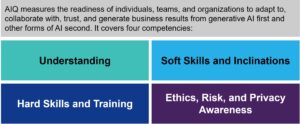Your Employees Aren’t Ready For AI — Prepare Them With AIQ

Employees improving their AIQ through intentional training efforts (image source)
Employee Readiness — Or Lack Thereof — Will Make Or Break Your Generative AI Strategy
Most leaders focus more on deploying generative AI (genAI) tools than on upskilling employees to be successful using them. That’s a potentially costly mistake. Employees — the humans at the center of your genAI ambitions — must possess sufficient levels of understanding, hard and soft skills, and ethical awareness to effectively use genAI as a tool in their jobs or to design customer-facing genAI solutions.
Dozens of clients have shared with me their plans to adopt genAI workforce tools like Microsoft Copilot for Microsoft 365. A recent discussion with a manufacturer was typical of what I hear: Eager to jump into the future, they planned to buy 5,000 licenses. But in their initial trial, fewer than half of their test employees made good use of it. Employee success varied by meaningful subgroups based on familiarity, training, and experience with genAI. Based on data they shared with me, I recommended that they only buy 500 licenses in the short term, distributing those licenses to the roles in the workforce with the most proven benefit so far, while also making a significant investment to train those employees and begin upskilling others even before they acquire the next wave of licenses.
Most Organizations Will Underinvest In Training By An Order Of Magnitude
Technology vendors advocate a “deploy first, train later” philosophy, unfortunately. OpenAI COO Brad Lightcap recently shared this tip about using ChatGPT Enterprise: “90% of the value comes from giving people access to the tool and not thinking too much about it.” He’s absolutely wrong. Two companies whose employees buy the same tools will get radically different results depending on the underlying readiness of their employees (measured by their AIQ and RQ, as we’ll see). Employees need training, resources, and support. Determining just how much assistance your employees will need is a key enablement priority and a prerequisite to success using genAI tools. In my dozens of guidance sessions with clients, every business case I have seen assumes just 1 hour of classroom training to prepare employees for Microsoft Copilot for Microsoft 365. This investment won’t suffice, because the skills needed for success can’t be taught in one sitting.
You Can Prepare Your People By Raising Their AIQ
In 2015, Forrester introduced RQ, the Robotics Quotient, which measures the ability of individuals, teams, and organizations to adapt to, collaborate with, and drive business results from automation, AI, and blockchain. From years of measuring and analyzing RQ, we learned that the best technology solutions can’t overcome a fundamental lack of skills, inclinations, beliefs, and resources in the workforce. Now, to address the genAI boom, we proudly announce AIQ, which we define as:

Employees who possess greater AIQ, as measured through these four competencies, will drive more productivity, make fewer errors, and open up your organization to fewer genAI-related risks. Clients can read our new reports to learn the full details of what each of these competencies entails.
Survey Your Teams And Leaders To Benchmark Your AI Readiness
Start by measuring where you are today. AIQ measures the readiness of both employees and leaders. In our 12-statement survey assessment, respondents answer questions across four different competencies that people need to succeed with genAI and other forms of AI. Clients can use our online survey tool (link here) to survey their entire team and to compare employees’ results with the perceptions that their leaders hold. Look out for the inevitable gaps — where leaders think that their employees are prepared but where employees admit they aren’t! Then request a guidance session with me to receive all your results and get my recommendations on your AIQ and genAI strategies.
J. P. Gownder is a vice president and principal analyst on Forrester’s Future of Work team. He leads Forrester’s research into generative AI for employees. He’s also lead analyst on Microsoft Copilot for Microsoft 365.
